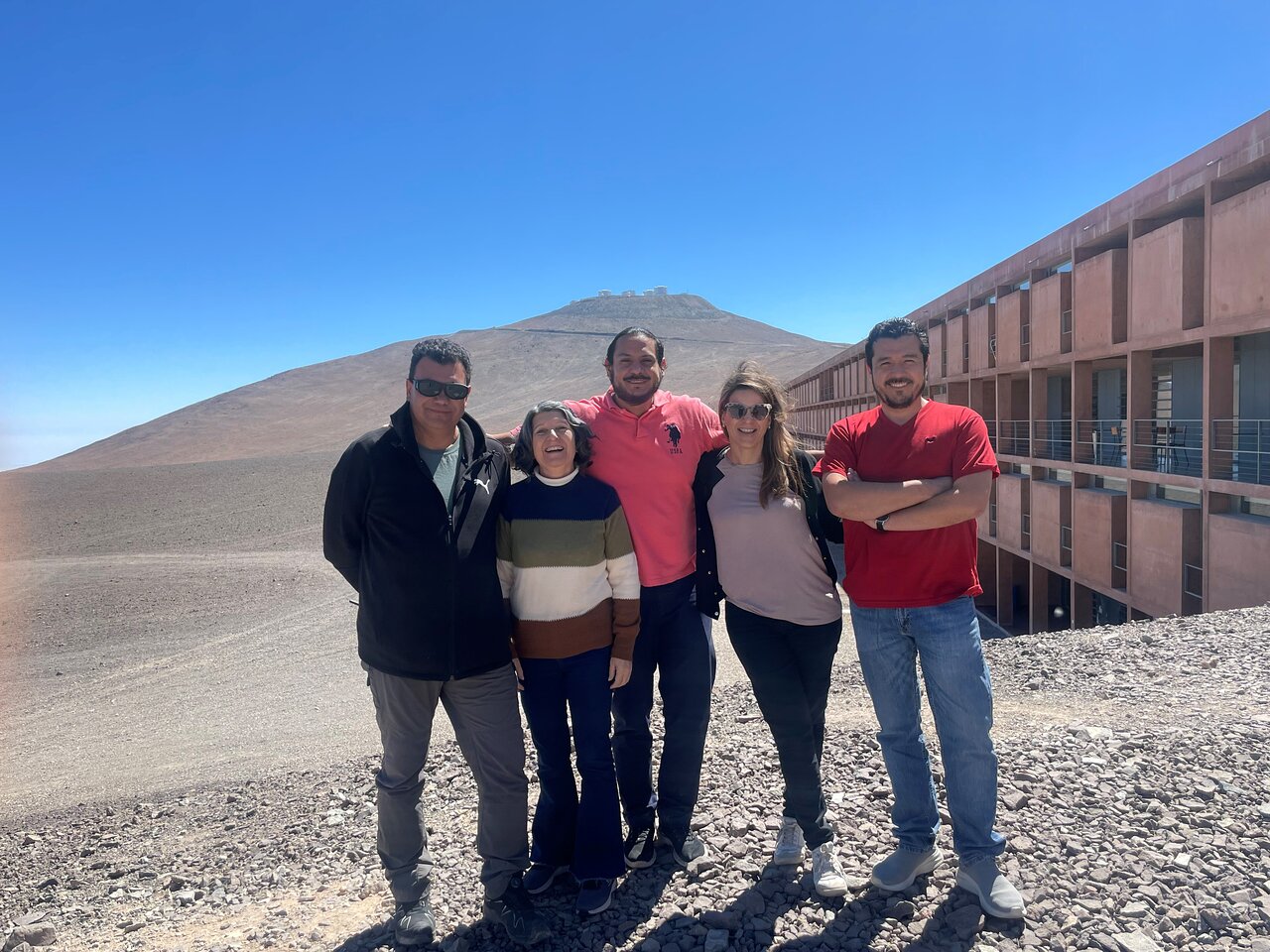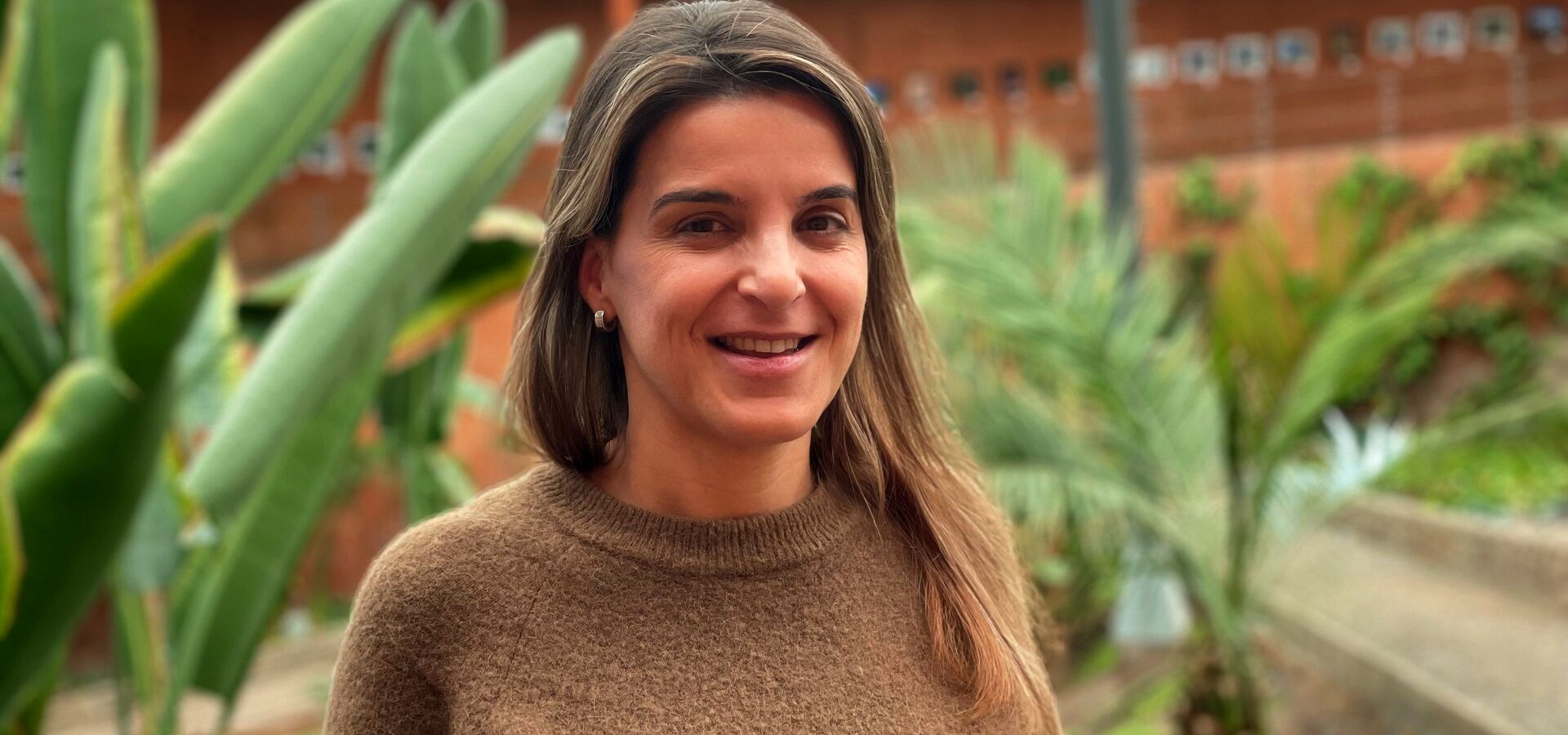In some ways, ESO’s Paranal Observatory in the Chilean Atacama Desert is akin to a small town. It’s home to world-class telescopes, which are certainly not commonplace in population centres, but it’s also a place with buildings where people live and work. We spoke to Vanessa Peidro Cid, Head of Paranal Logistics and Facilities, about the joys and challenges of managing this small community in the desert.
‘The mayor of Paranal’: that’s what Vanessa Peidro’s colleagues call her. “My family and I find that title very funny — who would have thought I’d ever hold a political office!” she jokes.
Paranal Observatory is one of the best astronomical observing sites in the world and hosts ESO’s Very Large Telescope (VLT). But telescopes alone do not make up an observatory — there are also scientific and support buildings, offices, a visitor centre, petrol and power stations, and accommodation for all staff and visiting researchers. All in all, Paranal looks and works like a small town, home to a rotating population of about 150 people, and Vanessa’s job is to direct it. But what does that exactly mean?
“My job is to ensure everything works correctly and efficiently so the astronomers and engineers working in Paranal can do their job easily, pleasantly and in good conditions,” Vanessa explains. “People travel to Paranal to stay here for one or two weeks, and they are far away from home, their families, and sometimes even their country — they’re making an effort. I consider my responsibility very important in that sense.”
Vanessa’s team provides transport, board, and lodging to everyone working in Paranal, including arranging flights, buses and taxis for incomers, and organising food catering. She is also in charge of the observatory’s civil infrastructure: everything unrelated to the telescopes. “My department makes sure everything else can work, in an invisible but fundamental way. For example, if people miss a flight and cannot reach the observatory, they can’t work; if the food is not good, if the gym is not functional… many small details affect their welfare and motivation.”
Vanessa joined ESO in January 2023. She is from Barcelona, Spain, and first moved to Chile in 2004, where she taught international law for two years at the University of Chile. She then relocated to Belgium and started working for the European Union in 2010. This new role brought her back to South America in 2014, first to Colombia and then to Argentina.
Her responsibilities at ESO are not that far of a leap from her previous jobs: “I had 9 years of experience in a relatively similar position — in diplomacy, not science; in an embassy, not in the middle of the desert — but I also ran infrastructure projects with lots of service contracts and managed teams.”
Although Vanessa’s background is in international law, astronomy has fascinated her since her childhood: “It’s a science that makes us non-scientists dream.” She heard about ESO during her time in Chile and found the organisation’s values aligned with her own. “For me, it’s always been important to work for an organisation that has a mission to benefit humanity, and ESO has that: science for all of humanity and not for profit. It inspires and motivates me.”
Located 150 kilometres south of the nearest city, Antofagasta, and 2635 metres above sea level, the desert environment of Paranal adds one or two extra logistical challenges — for example, water needs to be brought in daily by truck. The nature of astronomical research also means there are people working on both day and night shifts who need to be fed. “It’s a lot of little pieces you have to keep in mind,” Vanessa says. “I feel like an orchestra conductor sometimes, making sure everything works so the music keeps playing.”

The key to everything running smoothly is, of course, teamwork. Vanessa’s official team consists of five ESO staff members, but she considers all service contractors part of her extended team. In a given month, there are 60 people working on board and lodging alone, plus those in logistics, trip organisation, vehicle and infrastructure maintenance, at the front desk…
Work in Paranal usually happens in shifts. To protect staff’s physical and mental well-being, there is a rule preventing anyone from spending more than 15 days in a row up in the observatory. Depending on their role, people spend between one and two weeks on-site, with a rest period afterwards. This schedule can be discouraging to some, especially parents of young children, and Vanessa is aware of it: “I can understand it, I'm a mother too, and you think, can I really go away for a week regularly? And that stops you. But it’s manageable if you have the support at home. So I would encourage particularly more women to apply to such a position and allow themselves to have this professional experience, to not miss out!” She herself is often at Paranal for six to eight days, but if necessary she can also work from her home in Santiago, the capital of Chile. “I have a committed team that allows me to sometimes be away and know that things are still working well in Paranal.”
The 150 people or so regularly lodging in Paranal come and go everyday, so the team must always be on call. That means there is no such thing as ‘a normal day’ on the job. “I still haven’t found the one routine that applies to every day,” Vanessa says. In any case, her workday involves many meetings with the team, contractors and providers, and regular surveys and reviews “to see what’s working and what’s not and come up with solutions.” Thinking about the observatory, Vanessa beams with pride. “I really like being at Paranal. The place itself is spectacular — it’s so pure. I always tell my colleagues we are privileged to be working there. And they’ve done an excellent job of making it into a very pleasant place, with a great atmosphere!”
At the end of her workdays, Vanessa likes going out for desert walks on the habilitated paths, working out in the observatory’s gym and, especially, socialising, “sitting down with my colleagues for dinner, and listening to their stories, getting to know them since we’re living there together.” La Residencia, the award-winning accommodation offering researchers and workers a welcome respite from the harsh desert environment, is one of Vanessa’s favourite places: “I think it’s a work of art – the architect was a genius.” She also likes the amateur telescope fondly nicknamed ‘Unit Telescope 5’ –– as a nod to its much larger siblings, the four Unit Telescopes of the VLT ––, which she sometimes uses with colleagues. “There’s almost too little time up here. Of course, you also miss your family, but time goes by very quickly here and you’re never out of things to do, and people are very welcoming.”
The human factor is indeed Vanessa's favourite part of her job.“I like the challenge of making things work and improving them to make people happy. I like making people feel good, and I can do that in this job.”
And there’s a new challenge for Paranal’s logistics in the near future. ESO’s Extremely Large Telescope (ELT) is under construction on nearby Cerro Armazones, a 45-minute drive away. Once it’s finished, it will be the largest optical telescope in the world, with a 39-m wide main mirror, and it will be operated from Paranal alongside the VLT. To address the considerable logistical challenge of operating both telescopes from the same place, the ESO-wide Integrated Operations Programme, in which Vanessa is involved, is trying to answer the question of how to build and run the observatory of the future. “We want to be sustainable both environmentally and financially, instead of doubling the resources we spend.” Vanessa says. “We’re in the middle of a huge transformation process, so no day or week is alike.”
In practice, that means increasing the efficiency of many processes and, “thinking outside of the box of how we’ve been running things for the last twenty years. For example, if we’re now receiving one or two truckloads of water per day, instead of going up to four, maybe we could find ways to consume less water.” But Paranal’s location doesn’t allow every possibility: “There are sometimes excellent solutions that can be implemented easily in Santiago but not in the middle of the desert. For example, waste recycling — we’re currently looking for a company that can do it, but it might just not exist yet!”
Still, Vanessa enjoys the challenge this brings, and she firmly believes in the Integrated Operations Programme’s goals. “I want to be able to tell my grandchildren not only that I worked at Paranal and organised things so other people could work in such a special place, but also that I contributed to making the new observatory more sustainable. That not only are my colleagues doing a wonderful job for humanity, but we can do it efficiently, sustainably and without damaging our planet.”
It’s impossible to talk to Vanessa and not want to visit Paranal, to enjoy the vibrant community and see groundbreaking research in action. Hearing her dedication to her job, you’re sure you would be in good hands when staying in her remarkable town. “It’s a beautiful job,” she says with a smile. “When you see that things work and people are happy, you think: ‘it was worth it.’”
Links
Biography Elena Reiriz Martínez
Elena is a biologist originally from Asturias, northern Spain. After her bachelor’s degree at the University of Oviedo she moved to Germany for a master’s programme in neuroethology (neurobiology of animal behaviour) at the University of Würzburg. She then decided to branch out into science communication and completed an internship doing PR for a Wadden Sea National Park centre and a traineeship in the Science Education and Public Engagement office in EMBL Heidelberg. Now she’s at ESO to rekindle two of her old passions – astronomy and writing.





